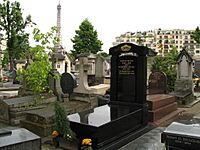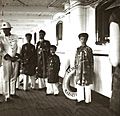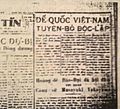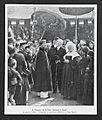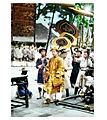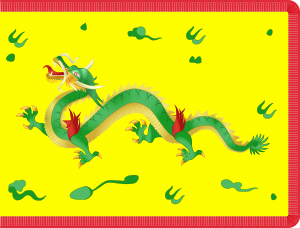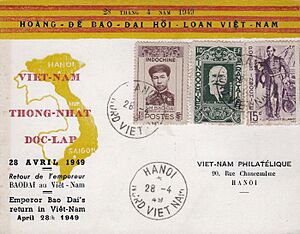Bảo Đại facts for kids
Quick facts for kids Emperor Bảo Đại保大帝 |
|||||
|---|---|---|---|---|---|
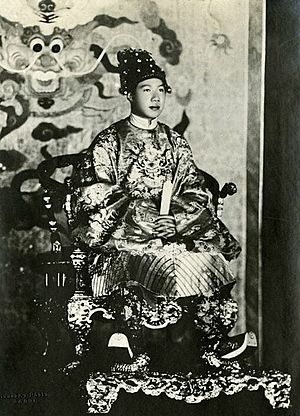
The Emperor on his throne, c. 1920s-30s
|
|||||
| Emperor of Vietnam | |||||
| Reign | 8 January 1926 – 30 August 1945 |
||||
| Predecessor | Khải Định | ||||
| Successor | Monarchy abolished Hồ Chí Minh (as president of the Democratic Republic of Vietnam) |
||||
| Chief of State of Vietnam | |||||
| Reign | 13 June 1949 – 26 October 1955 |
||||
| Predecessor | Position established Nguyễn Văn Xuân (as Head of the Provisional Central Government) |
||||
| Successor | Position abolished Ngô Đình Diệm (as president of the Republic of Vietnam) |
||||
| 1st Prime Minister of the State of Vietnam | |||||
| Reign | 14 July 1949 – 21 January 1950 |
||||
| Predecessor | Position established | ||||
| Successor | Nguyễn Phan Long | ||||
| Born | Nguyễn Phúc Vĩnh Thụy (阮福永瑞) 22 October 1913 Doan-Trang-Vien Palace, Imperial City of Huế, French Indochina |
||||
| Died | 31 July 1997 (aged 83) Val-de-Grâce, Paris, France |
||||
| Burial | Passy Cemetery | ||||
| Spouse |
Nam Phương
(m. 1934–1963)Bùi Mộng Điệp Lê Thị Phi Ánh Christiane Bloch-Carcenac Monique Baudot
(m. 1972–1997) |
||||
| Issue |
See List
Legitimate
Bảo Long (1936–2007) Phương Mai (1937–2021) Phương Liên (1938–) Phương Dung (1942–) Bảo Thăng (1943–2017) Unrecognized Phương Thảo (1946–) Phương Minh (1949–2012) Bảo Ân (1951–) Bảo Hoàng (1954–1955) Bảo Sơn (1957–1987) Phương Từ (1955) Patrick-Édouard Bloch-Carcenac (1958–) |
||||
|
|||||
| House | Nguyễn Phúc | ||||
| Father | Khải Định | ||||
| Mother | Hoàng Thị Cúc | ||||
| Religion | Confucianism Mahayana Buddhism Roman Catholicism |
||||
| Signature | |||||
Bảo Đại was the 13th and last emperor of the Nguyễn dynasty, which was the final ruling family of Vietnam. He was born on October 22, 1913, with the name Nguyễn Phúc Vĩnh Thụy. His era name, Bảo Đại, means "keeper of greatness."
From 1926 to 1945, he was the emperor of parts of Vietnam that were under French control. These areas were called Annam and Tonkin. In March 1945, the Japanese took control from the French and ruled through Bảo Đại. He changed the country's name to "Vietnam."
Bảo Đại gave up his throne in August 1945 after Japan surrendered. Later, from 1949 to 1955, he was the Chief of State for the non-communist State of Vietnam. Many people saw him as a ruler controlled by others. He was criticized for being too close to France and spending a lot of time outside Vietnam. In 1955, he was removed from power by his Prime Minister, Ngô Đình Diệm, who had support from the United States.
Contents
- Becoming Emperor: Bảo Đại's Early Life
- Family Life: Bảo Đại's Marriage
- Vietnam's Independence and Bảo Đại's Abdication
- Bảo Đại's Return to Power and the Indochina War
- Bảo Đại's Second Removal from Power
- Life in Exile: Bảo Đại's Later Years
- How Bảo Đại Was Seen in Vietnam
- Images for kids
- Bảo Đại Coins
- Famous Quotes by Bảo Đại
- Honors and Awards
- Symbols of His Reign
- See also
Becoming Emperor: Bảo Đại's Early Life
Bảo Đại was born Prince Nguyễn Phúc Vĩnh Thụy on October 22, 1913. His birthplace was the Palace of Doan-Trang-Vien in Huế, which was the capital of Vietnam. His father was Emperor Khải Định.
When he was nine years old, Prince Nguyễn Phúc Vĩnh Thụy was sent to France for his education. He studied at schools like the Lycée Condorcet and the Paris Institute of Political Studies.
On January 8, 1926, his father died, and he became the new emperor. He took the name Bảo Đại. However, he did not immediately return to Vietnam to rule. Instead, he went back to France to finish his studies.
Family Life: Bảo Đại's Marriage
On March 20, 1934, when he was 20, Bảo Đại married Marie-Thérèse Nguyễn Hữu Thị Lan in Huế. She was not from a royal family but came from a rich Catholic family in Vietnam. After their wedding, she was given the title Empress Nam Phương.
They had five children together:
- Crown Prince Bảo Long (born 1936)
- Princess Phương Mai (born 1937)
- Princess Phương Liên (born 1938)
- Princess Phương Dung (born 1942)
- Prince Bảo Thắng (born 1943)
Vietnam's Independence and Bảo Đại's Abdication
During World War II, in 1940, Imperial Japan took control of French Indochina, which included Vietnam. The Japanese allowed the French government to stay in place but made the important decisions.
In 1945, Japan removed the French and made Bảo Đại declare Vietnam's independence from France. Vietnam became the Empire of Vietnam. However, Japan surrendered to the Allies in August 1945.
After Japan's surrender, the Viet Minh, led by Hồ Chí Minh, wanted to take power in a free Vietnam. Hồ Chí Minh was popular because he opposed the French and helped during a terrible famine in 1945. He convinced Bảo Đại to give up his throne on August 25, 1945.
Bảo Đại then became a "supreme advisor" to Hồ Chí Minh's new government, the Democratic Republic of Vietnam (DRV). This government declared Vietnam's independence on September 2, 1945. However, the French later returned and removed the DRV government in November 1946.
Bảo Đại's Return to Power and the Indochina War
Bảo Đại stayed as an advisor for about a year. During this time, fighting broke out between different Vietnamese groups and the French. He left his role in 1946 and moved to Hong Kong. Both the French and the Viet Minh tried to get his support.
Eventually, a group of Vietnamese who were against communism asked Bảo Đại to return. They said they would support him if he worked for Vietnam's independence. This convinced him to talk with the French.
He signed agreements with France in 1947 and 1948. These agreements seemed to promise independence but did not give Vietnam much real power. Bảo Đại often traveled to Europe during this time, which led some to call him the "night club emperor."
In 1949, he finally signed the Élysée Accords. This led to the creation of the State of Vietnam, with Bảo Đại as its Chief of State. However, France still controlled Vietnam's army and foreign relations. Bảo Đại himself said that what was called a "Bảo Đại solution" was really just a "French solution."
Because he had little real power and spent much time away, many Vietnamese saw him as a French puppet. This helped the Viet Minh gain more support. In 1950, the United States recognized Bảo Đại's government. This led to the U.S. sending military aid to the French in Vietnam.
The war between the French and the Viet Minh continued to get worse. The French suffered a major defeat at Điện Biên Phủ. This led to the Geneva Accords in 1954, which divided Vietnam into two parts at the 17th parallel. The north went to the DRV, and the south became the State of Vietnam. Bảo Đại remained Chief of State for South Vietnam but moved to Paris and appointed Ngô Đình Diệm as his prime minister.
Bảo Đại's Second Removal from Power
At first, Ngô Đình Diệm did not have much power in South Vietnam. The Viet Minh controlled most of the countryside. Other powerful groups controlled different areas.
Diệm's forces began fighting against these groups. Bảo Đại tried to order Diệm to travel to France, but Diệm refused. Diệm eventually succeeded in pushing his opponents out of the capital, Saigon. He then used force and deals to get other groups to support him.
With growing support, a new group called the Popular Revolutionary Committee called for a vote. This vote would decide if Bảo Đại should be removed and if a republic with Diệm as president should be created. The campaign against Bảo Đại was very strong, and his supporters were not allowed to campaign for him.
The vote took place on October 23, 1955. The results showed that 98.9% voted to remove Bảo Đại and create a republic. However, many people said the vote was unfair and that there was widespread cheating. For example, in Saigon, the number of votes for a republic was much higher than the number of registered voters.
Bảo Đại was removed from power. On October 26, 1955, Diệm declared himself president of the new Republic of Vietnam.
Life in Exile: Bảo Đại's Later Years
After being removed from power, Bảo Đại lived in exile, mostly in southern France and Monaco. He often sailed on his private yacht.
In 1972, Bảo Đại made a public statement. He asked the Vietnamese people to come together and end the Vietnam War. He wanted peace and agreement in the country.
The Communist government of North Vietnam even sent people to France to meet with Bảo Đại. They hoped he would join a government that could reunite Vietnam. This was because he still had some influence among people in certain provinces.
After these meetings, Bảo Đại spoke out against the presence of American troops in South Vietnam. He also criticized the government of President Nguyễn Văn Thiệu in South Vietnam. He called for all political groups to create a free, neutral, and peaceful government.
In 1982, Bảo Đại, his wife Monique, and other members of the former royal family visited the United States. They attended religious ceremonies for Vietnamese Americans in California and Texas.
Throughout his life, Bảo Đại was often seen by many Vietnamese as a ruler controlled by the French. People felt he lacked real political power and cooperated too much with the French. However, Bảo Đại said that his rule was a constant struggle to keep the monarchy and the nation's integrity while dealing with French authorities.
Bảo Đại died in a military hospital in Paris, France, on July 30, 1997. He was buried in the Passy Cemetery.
How Bảo Đại Was Seen in Vietnam
The Communist Party of Vietnam considered Bảo Đại a traitor. After France helped him become head of state again, Ho Chi Minh said that Bảo Đại brought the French army back to Vietnam and caused more deaths. He called Bảo Đại a "true traitor." Hồ Chí Minh stated that the Vietnamese people were determined to fight for true independence.
Images for kids
-
Crown prince Vĩnh Thụy (right) and his cousin Vĩnh Cẩn in Paris (1926) during studying abroad in France
-
Declaration of Empire of Vietnam in 1945
-
The National assembly of the Democratic Republic of Vietnam on 2 March 1946, supreme advisor Vĩnh Thụy (Bảo Đại), sixth from right to left, next to President Hồ Chí Minh (middle).
-
Trần Trọng Kim, Prime Minister of Empire of Vietnam
-
Ngô Đình Diệm, Prime Minister of State of Vietnam, later president of Republic of Vietnam in 1955
-
Anti-Bao Dai's pro-french regime in State of Vietnam national assembly, Saigon, 1955
-
Emperor Khải Định, Prince Vĩnh Thụy (middle) and Albert Sarrault in Marseille, 1922.
-
Abd Al Rahman Barjach Pasha of Rabat, Bảo Đại and prince Vĩnh Cẩn in 1932.
Bảo Đại Coins
The very last cash coin ever made in the world has Bảo Đại's name on it in Chinese characters. There are three kinds of these coins, all made in 1933.
Famous Quotes by Bảo Đại
- In 1945, when the Japanese offered to protect him from a possible Viet Minh takeover, Bảo Đại said: "We do not wish a foreign army to spill the blood of our people."
- He explained why he gave up his throne in 1945 by saying: "We would prefer to be a citizen of an independent country rather than Emperor of an enslaved one."
- When France tried to set up a government with him after World War II, he said: "What they call a Bảo Đại solution turns out to be just a French solution."
- In 1972, from France, Bảo Đại asked the people of Vietnam for peace, saying: "The time has come to put an end to the fratricidal war and to recover at last peace and accord."
Honors and Awards
Bảo Đại received many honors during his life, both from Vietnam and other countries. These included:
- The Imperial Order of the Dragon of Annam (from Vietnam)
- The National Order of Vietnam (from Vietnam)
- The Order of the Royal House of Chakri (from Thailand)
- The Legion of Honour (from France)
- The Royal Order of Cambodia (from Cambodia)
- The Order of the Million Elephants and the White Parasol (from Laos)
- The Order of the Crown (from Belgium)
- The Sharifian Order of Al-Alaoui (from Morocco)
- The Royal Family Order of Johor (from Johor)
Symbols of His Reign
During Bảo Đại's time as emperor and later as Chief of State, several important symbols were created or used. These included imperial seals, his personal flag, and his coat of arms. The last traditional Vietnamese coins, called Bảo Đại Thông Bảo, were also made during his reign.
See also
 In Spanish: Bảo Đại para niños
In Spanish: Bảo Đại para niños
 | Dorothy Vaughan |
 | Charles Henry Turner |
 | Hildrus Poindexter |
 | Henry Cecil McBay |


